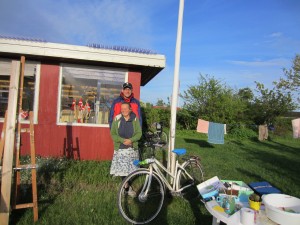Colonial Bliss Posted by Bjørn A. Bojesen on Jun 22, 2012 in Uncategorized
As you could read in the previous post, a kolonihave (”colonial garden”) is a special garden where some Danish families choose to live during summer. The house in such a garden is a kolonihavehus. The kolonihaver (with houses on) are usually gathered in ”holiday villages” called kolonihaveforeninger (”colonial garden clubs”). I met Nika and Karsten, two happy ”colonists”…
How long have you been the owners of a kolonihavehus?
Nika: For 14 years. Our son was 1 year of age and our daughter was 4 when we bought the house.
Karsten: And we haven’t regretted one sec that we bought it! Our best investment ever. I just had to lie on my back one minute in the grass, watching the sky – then it was settled!
What’s the good thing about having a kolonihavehus?
Karsten: I’d say it’s the frihed [FREEheth] (freedom), and that we have the possibility of inviting other people. That’s important. And I’m free to take care of my hobby…
What’s that?
Karsten: Sommerfugle [SOMorfool:eh] (butterflies)! I’ve got an aviary here in the garden; there my butterflies can fly around as they wish. I’ve got a box with larve/r [LAᵒʳvor](caterpillar/s); once they’ve become real butterflies, I let them into the aviary…
Nika: And all the while I grow vegetables. That’s something dejlig [DY-leeh] (nice, lovely) about life in a kolonihave – we’re almost self-sufficient!
What if it rains the whole summer?
Nika: One year ago it was raining really much here. Then we had to put on some more tøj [toy] (clothes), or make up some indoor activities. There’s always something to fix in a kolonihavehus! It has to be painted, we must make new doors and that kind of stuff. But of course we’d rather have sunshine, like now!
What do you do when you’re not in your kolonihavehus?
Nika: We’re staying here for the whole season, that is, from April 1st to sometime in September or October. The rest of the year we live in an apartment down in the city. We still go there to wash our clothes, but besides that, we try to be here as much as possible!
Karsten: And we’ve had no problems combining it with school and work. I’m a social worker, and Nika is a health care worker. And the kids’ old school was actually closest to the kolonihave! Here they had their friends, so during the winters they were actually longing to get back!
When seen from the outside, a kolonihaveforening may look a bit closed. There are high hedges between the houses… Do you talk to your neighbours at all?
Karsten: That depends a lot on each family. In a kolonihave it is very important to show consideration for your nabo/er (neighbour/s). You can’t start playing loud music and pretend you’re the only person in the world! But perhaps there is a moment when somebody waves their hand across the hedge, and all of a sudden you’re invited into another garden, or you invite some neighbours to a game of volleyball. There are many options!

Build vocabulary, practice pronunciation, and more with Transparent Language Online. Available anytime, anywhere, on any device.
About the Author: Bjørn A. Bojesen
I was born in Denmark, but spent large parts of my childhood and study years in Norway. I later returned to Denmark, where I finished my MA in Scandinavian Studies. Having relatives in Sweden as well, I feel very Scandinavian! I enjoy reading and travelling, and sharing stories with you! You’re always welcome to share your thoughts with me and the other readers.




